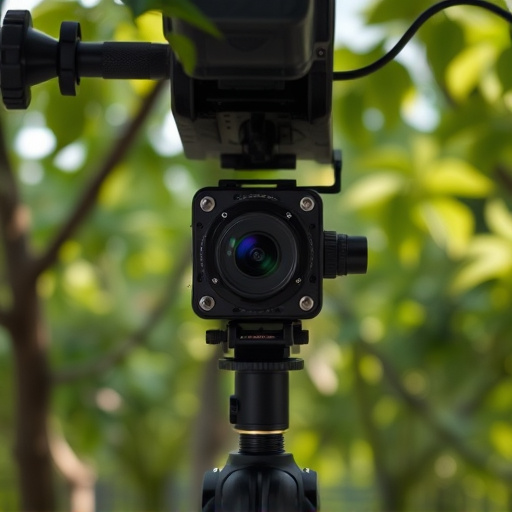When selecting spy cameras for residential security, focus on battery life comparisons. Choose unobstructed placement areas and strategically position cameras for maximum coverage. Compare models for flexible, discreet mounting and extended battery life vs. reliable wired connections and higher resolution video. Adhere to privacy laws when setting up secret camera systems, focusing on legal, ethical practices during a thorough Battery Life Spy Camera Comparison.
“Enhance your residential safety with our expert guide on secret camera mounting, offering a comprehensive overview of modern security solutions. Discover the art of choosing discreet locations for optimal surveillance, weighing battery life versus wired options, and exploring advanced spy camera technologies in HD comparisons. Learn about home privacy laws while ensuring ethical practices. Maximize peace of mind with our practical tips, focusing on the latest Battery Life Spy Camera Comparison to arm your abode effectively.”
- Choosing the Optimal Location for Discreet Cameras
- Power Considerations: Battery Life vs. Wired Options
- Spy Camera Technologies: Wireless and HD Comparisons
- Home Safety Privacy: Legal and Ethical Guidelines
Choosing the Optimal Location for Discreet Cameras
When selecting locations for discreet cameras, consider areas that offer unobstructed views and are out of plain sight. Windows, doors, and entry points are ideal spots as they allow for easy monitoring. Compare battery life spy cameras to ensure continuous surveillance without frequent replacements. Look for models with extended battery lifespans to minimize the need for constant charging or swapping.
In terms of placement, avoid areas where individuals can easily block the camera’s view, such as behind large furniture or objects that might obscure the lens. Strategically positioning these devices in corners or along perimeters offers maximum coverage. A thorough review of battery life spy camera options will help you choose the best performing models to maintain a robust residential safety network.
Power Considerations: Battery Life vs. Wired Options
When it comes to residential security cameras, one key factor to consider is power sources – specifically, battery life versus wired options. On one hand, battery-powered spy cameras offer unparalleled flexibility and portability. They can be discreetly placed in various locations without the need for complex wiring, making them ideal for monitoring hard-to-reach or remote areas of your home. Moreover, these cameras often come with extended battery life, allowing them to operate for days or even weeks on a single charge.
However, wired security cameras present their own advantages. They typically boast more reliable power sources and can support higher-resolution video feeds. Wired systems are less susceptible to power outages that can disrupt battery-powered cameras, ensuring continuous monitoring. In terms of battery life spy camera comparison, while battery-operated units excel in convenience and stealth, wired options offer enhanced stability and performance for comprehensive home security.
Spy Camera Technologies: Wireless and HD Comparisons
In the realm of residential safety, spy camera technologies play a pivotal role in enhancing security measures. When comparing wireless and HD spy cameras, one key aspect to consider is battery life. Wireless cameras, while offering convenience with their lack of cords, often rely on rechargeable batteries that require regular maintenance. On the other hand, HD spy cameras typically have longer battery lifespans, thanks to advanced power management systems.
A Spy Camera Comparison reveals that High-Definition (HD) models provide clearer and more detailed footage compared to their wireless counterparts. The higher resolution ensures better visibility, crucial for identifying individuals or activities within a residence. Moreover, HD spy cameras often come with night vision capabilities, allowing for around-the-clock monitoring. In terms of battery life spy camera comparison, while wireless models might offer real-time alerts and remote access, the longer lifespan of HD cameras makes them a more sustainable investment for residential security needs.
Home Safety Privacy: Legal and Ethical Guidelines
When setting up a residential security system using secret camera mounting, it’s crucial to balance privacy and security. Legal guidelines vary by region, but generally, capturing video footage within someone’s private residence without their knowledge is illegal unless there’s a legitimate security or investigative purpose. Even outside these spaces, ethical considerations come into play, especially when it comes to recording activities in common areas or visible from public spaces.
A key consideration for home owners considering spy cameras with extended battery life is the potential impact on neighbors and visitors. Compare different models not just based on features but also on privacy protections like motion-activated recording, time-lapse functionality, and secure data storage. Ensuring these devices respect both legal boundaries and personal privacy fosters a safe yet ethical home security environment.
When it comes to residential safety, secret camera mounting offers a powerful tool for peace of mind. By strategically choosing locations, considering power options like battery life versus wired connections, understanding spy camera technologies, and adhering to privacy guidelines, you can create an effective security system that provides both advanced surveillance and ethical coverage. A thorough review of these tips ensures your home is protected while respecting personal privacy. Remember, a well-informed decision regarding residential safety cameras is the first line of defense for any homeowner.
